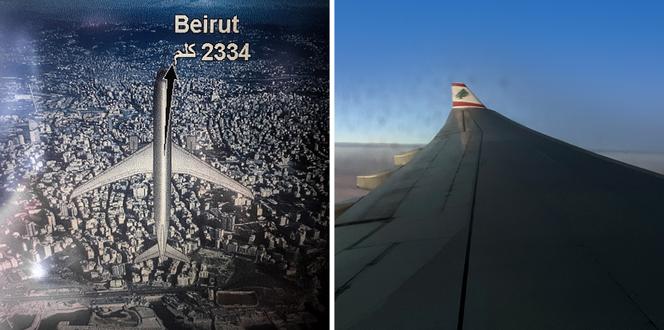
Despite the war, flights are continuing to operate at Beirut International Airport. Every day, the arrival and departure board displays destinations from all over the world: Frankfurt, Paris, Geneva, Jeddah, Amman, Baghdad, Dubai … yet only one commercial airline, Lebanon’s Middle East Airlines (MEA), is still operating. Located on the coast, the country’s only civilian airport is close to the capital’s densely populated southern suburbs where the Israeli army is stepping up strikes against what it considers to be Hezbollah bases. Since the beginning of the conflict, numerous photos have flooded social media, showing MEA planes taking off or landing – between 32 and 40 flights a day, barely less than usual for this time of year – while plumes of smoke rise into the sky.
“These days, I feel like I’ve got a mission, like the army that has to defend the population,” said MEA steward Khalil (a pseudonym, as the company forbids its employees to speak to the media). “We must maintain this air bridge for our compatriots. It’s our way of saying, ‘We’re here for you!’ This is the message of hope that we want to convey to the Lebanese.”
On social media, messages of support for MEA are pouring in. Once criticized for the quality of its service, the company has become a symbol of unity and hope for a population disappointed by its leaders. “Passengers are expressing their gratitude to us for continuing to fly despite the risks,” explained thirty-something Khalil, whom we met in a Beirut café. “They’re calmer than usual, less demanding. For example, they don’t complain about the reduction in certain services, such as hot meals, which have been withdrawn, as the situation has affected our kitchen staff,” he pointed out, drawing on 10 years of experience with MEA.
Ticket prices stabilized
During the 2006 war, Beirut airport was bombed by the Israeli air force on the second day of the conflict. So far this year, the only air link between Lebanon and the rest of the world has continued to operate. MEA, which has around 700 crew and 200 pilots, is sure that Israel “would not target its aircraft or the airport as long as they were used solely for civilian purposes,” said Captain Mohammed Aziz, adviser to MEA management, quoted by the Associated Press. However, a number of air strikes have already hit areas close to the airport, including one on October 20, which hit the coastal area of Ouzaï, very close to the airport. On that day, according to the Lebanese daily L’Orient-Le Jour, citing a Lebanese security source, air traffic had not been disrupted because of the strikes.
You have 37.89% of this article left to read. The rest is for subscribers only.
